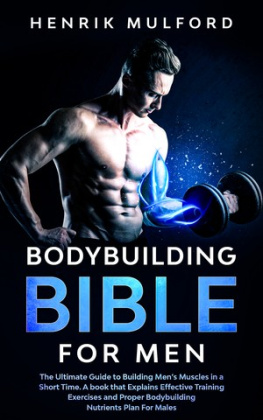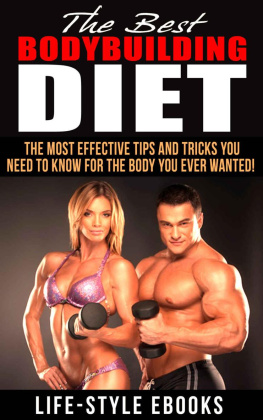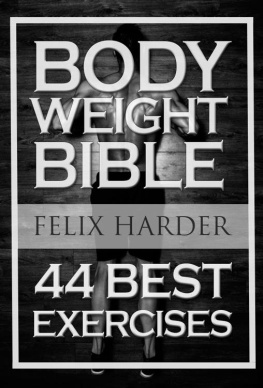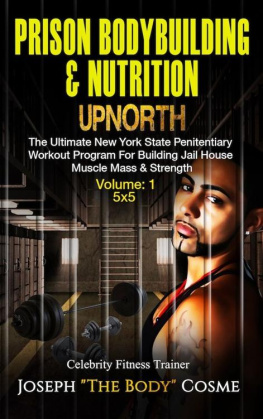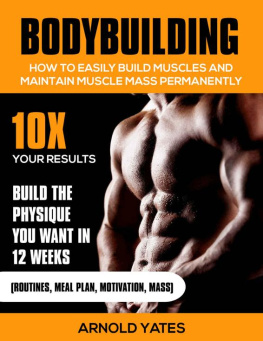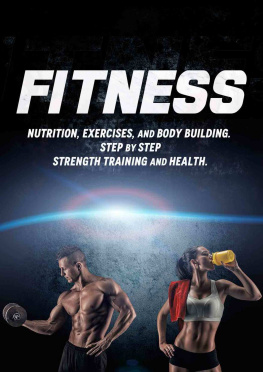The Bodybuilding Bible for Men II
Guidebook to help building muscles with science-based bodyweight workout, body composition, body confidence & mass nutrition, fitness trainer tips that truly make an impact to bodybuilding results
Henrik Mulford
Copyright 2020
All Rights Reserved. No part of this book may be reproduced in any form without permission in writing from the author. Reviewers may quote brief passages in reviews.
Disclaimer: No part of this publication may be reproduced or transmitted in any form or by any means, mechanical or electronic, including photocopying or recording, or by any information storage and retrieval system, or transmitted by email without permission in writing from the publisher.
While all attempts have been made to verify the information provided in this publication, neither the author nor the publisher assumes any responsibility for errors, omissions, contrary interpretations of the subject matter herein, or liability whatsoever on behalf of the purchaser or reader of these materials.
Table of Contents
Introduction
In the earlier version of this book The Bodybuilding Bible for Men - We laid a strong foundation for anyone interested in developing the perfect physique. Generally, building means raising, constructing, developing, or the act of assembling something. The same applies to bodybuilding since it's basically constructing muscles and empowering one's body through exercises. Bodybuilders are big, so they're easy to recognize; they have protruding muscles and proper curves. They regularly have noticeable popping veins because of the muscles pushing them to the surface of the skin. At this point, bodybuilding is not simply a game; it is now a subculture, and like any culture, it needs its book.
This subculture is a gathering of individuals that share an interest and obsession with the building of muscle. Every bodybuilder places a need for practicing and eating correctly to allow for the construction of muscles. This is something non-muscle heads consider as bizarre or even insane.
Indeed, bodybuilders wholeheartedly enjoy being offbeat and unique. Due to the excessive time spent in the gym working out, bodybuilders wind up spending most of their leisure time with fellow muscle heads than others.
Before we go further in this book, its only proper that we enlighten ourselves a bit on the history of this culture of ours. Eugen Sandow, a Prussian (presently part of Russia) born in 1867, is regarded as the 'originator of bodybuilding.' Sandow's perfectly etched muscular physique seemed like that of a god to numerous people in the late nineteenth century. Sandow was the first known individual to attain such strong physical flawlessness. At 19, he made bodybuilding appear as a form of entertainment, flaunting his hand weight and strongman stunts. People were dazzled by his capacity to break a chain tied around his chest or lift individuals with one arm. Before long, Sandow had garnered a huge following of people, propelled by his skill and strength.
In 1890 Europe, this subculture of ours turned into a type of entertainment with the performers known as "strongmen." The purpose of lifting weights as of now was less for actual appearance but showcasing ones tremendous strength to the crowd. However, a lot of these strongmen were quite overweight and ugly. It would be some time before the bodybuilding society as we know it today (with its accentuation on looks as much as, or more than, strength) appeared.
In the last part of this book, we explained topics like the bulking and cutting phases in the process of bodybuilding.
An individual would mass/bulk when their essential objective is to build muscle.
We made it clear that bulking doesn't mean you can eat whatever you like. It's important to stick to the definitive objective to bulk, which is to amass muscles while downplaying fat increase and keeping an adjusted eating routine. After all, it is the muscle you want to gain. Eventually, you must cut-off the fats; thus, you shouldn't make things harder for yourself!
When cutting, the goal is to lose fat but maintain the entirety of the muscle you've constructed. Bodybuilders usually switch back and forth between the two phases until theyre as lean and solid as desired.
Men need to maintain the consistency of their goals at all times. Be certain that your short-term objectives uphold your long-term ones, as opposed to undermining them.
A lot of amateur bodybuilders make this mistake. A man that says he wants upgrades to his build may yet state he has difficulty remaining roused in the offseason. Therefore to inspire themselves, they diet for shows. Sadly, because you are continually abstaining from excessive food intake for shows, you won't make the needed increases and enhancements in the long haul.
It all really just comes down to focus. The capacity to be engaged and buckle down for brief timeframes is typical. On the other hand, the capacity to grind for a long time, or years is whats unique.
If you need steady outer inspiration, i.e., competition, you need to go back to the drawing board. Motivation must be natural if you must maintain your passion. Anything you desire to do, be it working out, powerlifting, shedding 50 pounds, finding a good job, a degree, and so on. It has to be your passion! So much so that you can't stand the possibility of not chasing it.
Building muscle requires a positive energy balance, which implies that you should take in a greater number of calories than youd burn. You need approximately 2,800 calories to assemble a pound of muscle and help protein turnover, increasing with training.
What's more, research recommends that devouring lean protein 15 to 20 minutes prior, during, and within an hour of working out may improve muscle construction. Since you cant be eating chicken breast or a steak at the gym, a protein supplement or drink might be valuable during or after exercises.
Notwithstanding, it's not about protein. It's tied in with eating numerous dinners that meet your calorific requirements and give you sustenance. This is to assist you with building muscle, lose fat, and get more strength.
"The least demanding change you can make to your routine when you're building from home is to wake up with some cardio in the morning. This should be done preferably before you eat breakfast to get well digested.
One virtue bodybuilders are known for is self-awareness. Muscle addicts are very mindful. Their hunger for approval leads to a transformation all body sensors align into a 360-degree body-cam that captures their world. Every development on the exterior passes under the magnifying instrument. Insecurities and a powerful urge power this behavior to make everyone around say, "wow."
A builder that's self-aware also needs to consider the proper nutrition for his body. After all, as significant as weight training may be, there will be no development in taking the wrong food. Simply put, a trainer will have to eat more than the normal human; very nearly having to consume as much as a superhuman. Devouring more carbohydrates and proteins (3-5 times more than the customary sum) is necessary. Generally, weight lifters have lower fat than most other athletes (3-4%). This is why they are sometimes called lean machines.
Proteins are basic to constructing and retaining muscle. Being the main ingredient for muscle development, proteins give the fundamental fuel to a weight lifter. Carbohydrates provide the body's energy to finish exercises so that muscles might be separated and reworked by the body into greater forms of themselves.
A bodybuilder's meal has to be balanced for general wellbeing purposes. Water is another thing that the builder must consume more than the average human to support development. In the previous book, we outlined the particular kinds of fats that are fundamental to a professional bodybuilder's eating regimen.


